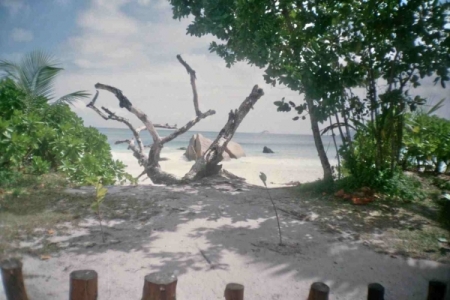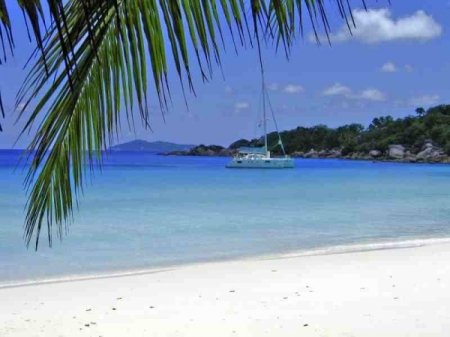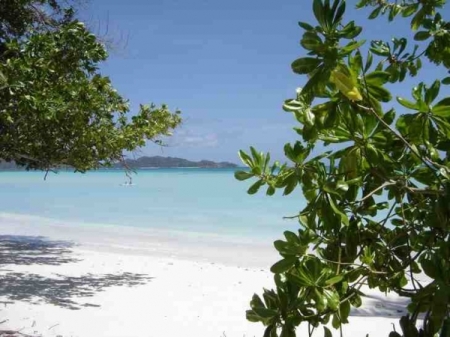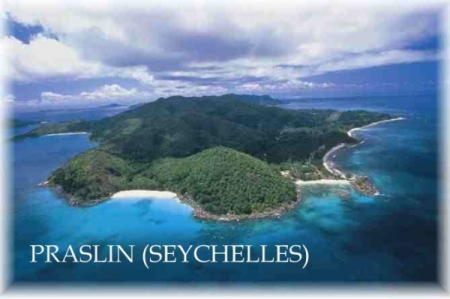It is also home to one of Seychelles’ two World Heritage Sites – the Vallee de Mai – a primeval rainforest containing the famous Coco de Mer palms, which have the largest, heaviest and most suggestively shaped nuts in the world. Vanilla orchids, a variety of lizards and some of earth’s rarest birds also reside there. Praslin, though small, more than warrants exploration. Thanks to its geography, it is also the ideal place from which to visit many of the other islands.
On the island of Praslin, Vallée de Mai has largest amount of coco de
mer palms in the Seychelles, 4000. This valley’s prehistoric forest is
World Heritage listed. Here you will also find the fascinating wild
pineapple, wild coffee and the allspice bush. You may even spot the
Seychelles black parrot, which is only found on Praslin.
Anse Lazio is the best beach on Praslin and one of the best in the
country. It is located on the far north of the island. The beach has
sparkling white, soft sand some rounded granite boulders and some good
waves. The water is a spectacular turquoise colour. It is a great beach
for snorkelling.The islands lie outside the cyclone belt but receive monsoon rains from November to February with the northwest trade winds. This hot and humid season gives way to a period of cooler weather though the temperature rarely falls below 23°.
Locality:
Praslin is off the east coast of Africa, in the Indian Ocean and is
660 mls NE of Madagascar, 995 mls E of Kenya. Praslin’s small airport
lies 5 mls W of Vallee de Mai and 23 mls NE of the main island of Mahe.
It is surrounded by many smaller islands, including La Digue and
Curieuse, which is 15 mins by air from Mahe, and 3 hrs by local
schooner, and 1 hr by catamaran.The area is suited to upmarket couples and families, particularly suited to honeymooners and those placing an emphasis on luxury retreat with natural beauty.
There are majestic bays and long beaches alternate with small coves. Most development is focused on 2 main strips of coastline: in the east (Cote d’Or) and in the west (Grand Anse).
The Cote d’Or in particular offers long stretches of golden sand and
sheltered, shallow water; good for families. From late May to November
the whole of the south west coast is affected by seaweed, while from
November to February it is the turn of the north east coast.
Hotels generally provide free transport to the other coast at these
times. Snorkelling is best in the more sheltered NW bays and in parts of
the Cote d’Or. Anse Lazio, in the NW, is good for swimming and
snorkelling and is reputed to be one of the most beautiful beaches in
the world, although arguably there are several which could live up to
that title.Anse Lazio is not directly accessible by public transport, entailing a long walk on very steep roads from the nearest bus stop (you could always use a hire car or taxi).
During the daytime most activities are beach and water sports based, however cycling and hiking in the Vallee de Mai are also popular.
The nightlife here offers a handful of local dance halls, also 3 discos
in proximity of hotels which are only open at weekends. The Casino at
Cote d’Or provide entertainment for the gambler. Evening entertainment
is available in some hotels and restaurants; otherwise it’s peace and
quiet.
There is a limited choice of eateries which means that many visitors
stay on a half-board basis. Only a handful of independent restaurants
and cafes exist on the island offering local creole specialities and
fish dishes. Hotels provide the usual international fare, often with a
creole option; their restaurants are generally open to the public.
Prices tend to be high.








0 comments:
Đăng nhận xét